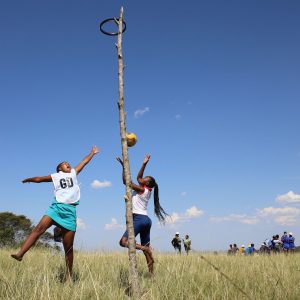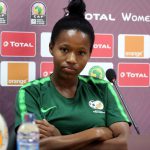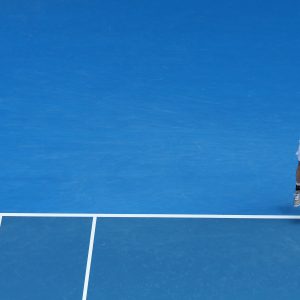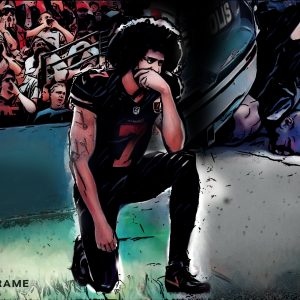Lydia Monyepao’s long game at Safa
The former Banyana player and team manager believes those two previous roles will serve her well in her new big job at the South African Football Association.
Author:
9 August 2021

Lydia Monyepao admits that the five years that she has in office at the South African Football Association (Safa) are not enough to start seeing a dramatic change in South African football. But the 42-year-old is confident that the foundation she will lay to turn things around at Safa will benefit future generations – giving them a financially stronger and stabler environment than the one she was exposed to as a Banyana Banyana player and team manager.
Monyepao, who was appointed as chief operations officer, is part of a new breed of leaders who have been appointed by the association – from chief executive officer Tebogo Motlanthe to former Banyana captain Amanda Dlamini, who will serve as the senior commercial and marketing manager. The trio has a mammoth task ahead, with Safa’s reputation in tatters and coffers almost dry.
Related article:
It will take time to turn things around, which makes Monyepao a good fit as she is used to playing the long game. As a Banyana player in the early 2000s, she made a sacrifice that would benefit her later in life – and could now change the fortunes of the senior women’s national team. “I played for Banyana in 2002 to 2004, that’s when I got the majority of my [20] caps,” she said.
“I played in the AWC [Africa Women’s Championship, now called Women’s Africa Cup of Nations] qualifiers and the AWC tournaments themselves, but then I was doing my audit articles. I started in 2003 with my audit articles with EY [Ernst & Young], after I finished my honours I continued working. Then in 2004 I called it quits at Banyana after the AWC that was held here because I was like, ‘I don’t see myself making money out of this sport,’ and I was sacrificing my actual career for this.
“They would call me for camps and I would take leave, my leave would run out and I would take unpaid leave, then I would never get the money (from playing). Then you end up paying for your car, accommodation and stuff like that. I was behind with my audit articles, so, in 2004, I had to call it quits.”
Related article:
While focusing on her auditing career, Monyepao was offered an opportunity to work in the global services department at Ernst & Young. The auditing firm had an account with the 2010 World Cup local organising committee (LOC) to do financial management. Her football background made her an easy choice for this project.
While she was busy building her name in the financial sector, Monyepao lost her parents in a short space of time. Her mother died in December 2007, only for her father to follow in March the next year. While dealing with that grief, an opportunity to study her Masters in Sports Management presented itself through a scholarship with the British Council at Loughborough University.
“They gave me the scholarship and I had to pack up my bags, leave my job with EY and then I went to the UK in September 2008. I saw this as an opportunity to go away and heal because I was going through a lot. I was not in a good space. That scholarship was a good thing for me, just to get away from everything,” she says.
Back ‘home’, back to football
After she qualified, she returned home but was unsure whether to get back to corporate. This opened the door to work with the 2010 LOC before returning to the University of the Witwatersrand as the sports and communications officer between December 2010 and February 2012. She then went to work at Safa as the Banyana manager before the team headed to its first Olympic Games in London.
“It was easier for me to relate and have empathy to what the players are going through. But at the same time be able to explain to them why we can’t do certain things,” she said. “I know sometimes they would want to fight but I would go, ‘Woah, these are the facts.’ You can find things that players would not be exposed to, that they should have been exposed to because you are digging deeper than someone who’d say, ‘I’m just doing my job.’ Whereas, as a former player, you start exploring other alternatives.
“You know what the players are putting in, so you also go the extra mile. You start going to the people you can approach and have the conversation that the previous person didn’t have with the management. For example, when I was there I didn’t even realise that players never put tax returns in.”
Related article:
Her understanding of the challenges that national team players and team management go through will stand her in good stead in the Safa position she was lured to from the University of Pretoria’s TuksSport, where she served as the deputy director.
The call to have former players get into leadership at Safa has been ringing for years. It is the belief the former players would know how to fix the mother body especially when it comes to performance of the national teams on the international stage.
“It’s highly important that former players get involved because it gives them opportunities to see things from both sides,” she said. “You know what it takes to be successful or not successful. So you can see the gaps that exist from the management perspective when you’re on this side so when you’re on the other side you get to understand what it takes to make a team successful as well. You know the challenges and hurdles that are in the way that prevent someone from taking a team from A to B.
Related article:
“In terms of women’s football, it’s one of my key performance areas. I will be looking into taking women’s football forward, from where it is right now. I can’t say where we want to be because I need to get the CAF strategy to see what CAF wants to do with women’s football. I think from there we can take that and work on it to say this is in line with what CAF and Safa wants to do in terms of women’s football. I think a lot of things are already happening, it’s just there is no strategy in place. You need a strategy with key deliverables, goals you want to achieve and the timeline.
“It’s important to include other people in these discussions. I cannot say it’s my vision for women’s football when there’s many stakeholders where women’s football is concerned. I’m talking about journalists, former players, current players, sponsors, current and potential sponsors that are out there. The institutions. University sport is quite strong when it comes to football, [for example]. Stakeholder relations are quite important. For me, it’s one of the key things; because if we are to attract more sponsors we need strong stakeholder relations and management.”
Vital to grow young talent
The difference in performance at international competitions and development between South Africa and other countries, especially outside the continent, is the investment in youth football. Some countries have regular little leagues for children as young as seven, both girls and boys, something Monyepao hopes will change in South Africa. In most provinces, school football in the form of leagues, especially for girls, ceased to exist a long time ago. The competition at this level was a chance for scouts and selectors to find future stars.
“We need to say how do we get youth football going especially on the women’s level. We can see the boys are doing something but what is happening at Under-6, Under-8 women’s football as far as the girls are concerned? Those are the spaces that we need to tap into. You look in the United States, girls start playing football as young as four-five years and we start seeing girls in the system at a very late stage. What is it that they are doing before then? We can’t expect a national coach to be working with players that are 17-years old and trying to change the way they play, the way they kick the ball. We need to start at a very low level.”




